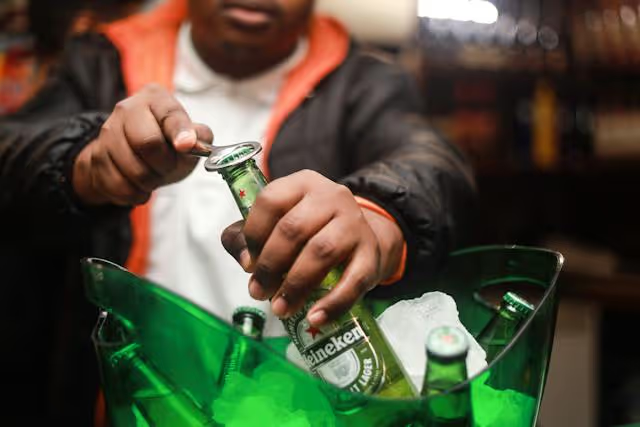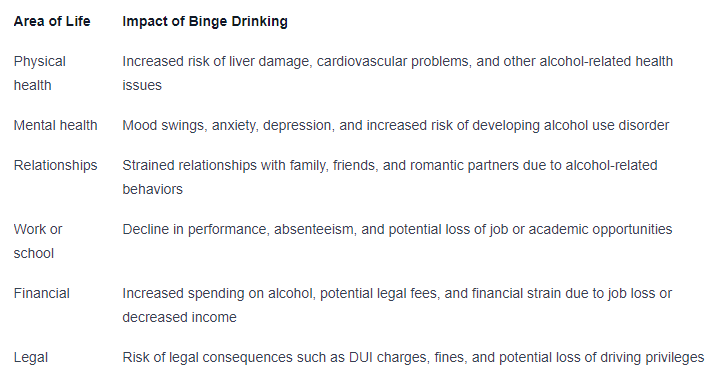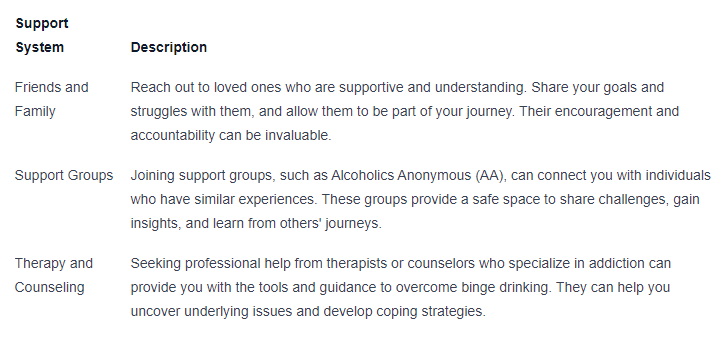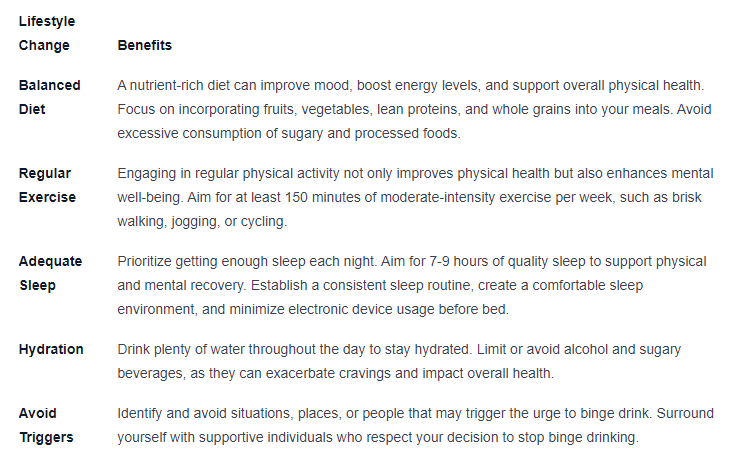How to Stop Binge Drinking?

Understanding Binge Drinking
When it comes to addressing binge drinking, it is important to first have a clear understanding of what it entails and the potential risks and consequences associated with it.
Definition of Binge Drinking
Binge drinking is defined as the consumption of a large amount of alcohol within a short period of time. It is typically characterized by consuming multiple drinks in a single session, leading to a rapid and excessive increase in blood alcohol concentration (BAC). The specific threshold for binge drinking may vary across different countries, but it is generally recognized as:

It is important to note that these definitions are general guidelines and individual tolerance levels may vary. Binge drinking can occur at any age and is not limited to any specific demographic.
Risks and Consequences of Binge Drinking
Binge drinking can have a range of detrimental effects on both physical and mental health. Some of the risks and consequences associated with binge drinking include:
- Alcohol Poisoning: Consuming large amounts of alcohol in a short time can lead to alcohol poisoning, which can be life-threatening.
- Impaired Judgment: Binge drinking impairs cognitive function, leading to poor decision-making, increased risk-taking behavior, and impaired coordination.
- Physical Health Problems: Regular binge drinking can contribute to a variety of health issues, including liver disease, cardiovascular problems, and an increased risk of certain cancers.
- Mental Health Issues: Binge drinking can exacerbate or contribute to mental health disorders such as depression, anxiety, and alcohol use disorder.
- Accidents and Injuries: Binge drinking increases the risk of accidents, falls, and other injuries, as well as involvement in risky behaviors such as driving under the influence.
- Social and Relationship Problems: Binge drinking can strain relationships, lead to academic or job-related difficulties, and impact overall social functioning.
Understanding the definition of binge drinking and being aware of the risks and consequences associated with it is an important step in addressing and overcoming this behavior. It is essential to take proactive measures to prevent and manage binge drinking for the sake of one's health and overall well-being.
Recognizing the Need for Change
When it comes to stopping binge drinking, the first step is recognizing the need for change. This involves understanding the signs and symptoms of binge drinking and assessing the impact it has on your life.
Signs and Symptoms of Binge Drinking
Binge drinking is characterized by consuming a large amount of alcohol within a short period, typically leading to a state of intoxication. It's important to be aware of the signs and symptoms that may indicate a binge drinking problem. Some common signs include:
- Drinking excessively and rapidly, often to the point of blacking out
- Feeling a loss of control over the amount of alcohol consumed
- Neglecting responsibilities and obligations due to drinking
- Experiencing frequent hangovers and withdrawal symptoms
- Engaging in risky behaviors while under the influence, such as driving or unsafe sexual activity
- Developing tolerance and needing to drink more to achieve the desired effect
Recognizing these signs and symptoms is crucial in determining whether you have a binge drinking issue that requires attention and intervention.
Assessing the Impact on Your Life
Understanding the impact that binge drinking has on your life is an essential step towards change. Take the time to honestly assess how binge drinking affects various aspects of your life, including:

By honestly evaluating the impact of binge drinking on these areas of your life, you can gain a clearer understanding of the need for change and the potential benefits of stopping binge drinking.
Recognizing the signs and symptoms of binge drinking and assessing its impact on your life are vital steps in the journey towards stopping binge drinking. Once you have acknowledged the need for change, you can move forward and explore strategies to overcome binge drinking and achieve sobriety.
Strategies to Stop Binge Drinking
When it comes to stopping binge drinking, implementing effective strategies can make a significant difference in achieving sobriety. Here are two key strategies to consider: setting goals and motivation, and seeking support systems.
Setting Goals and Motivation
Setting clear and realistic goals is an essential first step in the journey to stop binge drinking. By defining your objectives, you provide yourself with a sense of purpose and direction. Consider the following tips when setting goals:
- Define your reasons: Reflect on why you want to stop binge drinking. Is it for your health, relationships, or personal growth? Understanding your motivations will strengthen your commitment.
- Set specific and measurable goals: Clearly define what you want to achieve and establish measurable milestones. For example, you might aim to limit alcohol consumption to a specific number of drinks per week or eliminate binge drinking entirely.
- Break it down: Divide your larger goal into smaller, more manageable steps. This approach allows you to track your progress and provides a sense of accomplishment along the way.
- Reward yourself: Celebrate your achievements as you reach milestones. Rewarding yourself for staying on track can boost your motivation and reinforce positive behavior.
Seeking Support Systems
Building a strong support system is crucial when striving to stop binge drinking. Surrounding yourself with understanding and encouraging individuals can provide the necessary emotional support and guidance. Consider the following support systems:

Remember that seeking support is not a sign of weakness but a proactive step towards achieving your goal of sobriety. Whether it's relying on the understanding of friends and family or seeking professional guidance, having a support system can significantly increase your chances of success.
By setting goals, finding motivation, and seeking support systems, you can embark on the path to stop binge drinking. Remember that everyone's journey is unique, and progress may take time. Stay committed, reach out for help when needed, and celebrate your achievements along the way.
Building a Strong Support System
When it comes to stopping binge drinking, building a strong support system is crucial for success. Surrounding yourself with people who understand your journey and can provide the necessary support and guidance can make a significant difference. There are two main components of a strong support system: friends and family, and professional help and treatment options.
Friends and Family
Friends and family play a vital role in providing emotional support during the journey to sobriety. They can offer understanding, encouragement, and accountability. Sharing your goals and challenges with loved ones can help alleviate feelings of isolation and provide motivation to stay on track.
It's important to identify the individuals in your life who are supportive and willing to assist you in your quest to stop binge drinking. Communicate your needs and boundaries clearly with them. Let them know how they can best support you and what you expect from them. Regular check-ins, open conversations, and participation in alcohol-free activities together can foster a sense of camaraderie and strengthen your connection.
Tips for Building Support from Friends and Family
Communicate openly and honestly about your goals and challenges.
Set boundaries and let them know what you need from them.
Engage in alcohol-free activities together.
Regularly check-in and provide updates on your progress.
Professional Help and Treatment Options
In some cases, seeking professional help and treatment options is necessary to overcome binge drinking. Professionals such as therapists, counselors, or addiction specialists are trained to provide guidance and support tailored to your specific needs. They can help you develop coping strategies, navigate challenging situations, and address the underlying causes of your binge drinking.
Treatment options for stopping binge drinking may include therapy, support groups, or specialized programs. These resources offer a structured approach to recovery and provide a safe space to share experiences and learn from others facing similar challenges.
Professional Help and Treatment Options
Individual therapy with a licensed therapist or counselor.
Group therapy or support groups for individuals dealing with alcohol addiction.
Inpatient or outpatient treatment programs for comprehensive support.
Online resources and virtual support communities.
Remember, seeking professional help is not a sign of weakness but rather a courageous step towards a healthier and happier life. Professionals can provide the guidance and tools necessary to address the underlying issues contributing to binge drinking and help you develop effective strategies for long-term sobriety.
By building a strong support system that includes both friends and family, as well as professionals, you are creating a network of individuals who can provide the encouragement, understanding, and expertise needed to navigate the challenges of stopping binge drinking. With their support, you can increase your chances of achieving and maintaining sobriety.
Coping Strategies and Techniques
Breaking the cycle of binge drinking requires implementing effective coping strategies and adopting healthier lifestyle choices. By addressing the underlying causes and finding alternative ways to manage stress and emotions, individuals can successfully overcome binge drinking habits. Here are three key coping strategies and techniques to consider:
Stress Management
Stress is often a triggering factor for binge drinking. Learning how to manage stress in healthier ways can significantly contribute to overcoming the urge to binge drink. Consider incorporating the following stress management techniques into your daily routine:
- Deep Breathing: Practice deep breathing exercises to help calm your mind and reduce stress levels.
- Meditation: Engage in regular meditation sessions to promote relaxation and mindfulness.
- Exercise: Physical activity releases endorphins, which are natural mood boosters. Find an exercise routine that suits your preferences and commit to it regularly.
- Yoga: Yoga combines physical movement with mindfulness, providing a holistic approach to stress reduction.
- Journaling: Write down your thoughts and feelings in a journal to gain clarity and promote self-reflection.
By incorporating stress management techniques into your daily life, you can develop healthier coping mechanisms and reduce the reliance on binge drinking as a means of stress relief.
Healthy Lifestyle Changes
Adopting a healthy lifestyle is crucial for breaking free from binge drinking habits. Making positive changes in areas such as diet, exercise, and sleep can contribute to overall well-being and help you maintain sobriety. Consider the following healthy lifestyle changes:

By adopting a healthier lifestyle, you can create a foundation for long-term sobriety and improve your overall well-being.
Developing New Hobbies and Interests
Finding alternative activities to replace binge drinking can be instrumental in maintaining sobriety. Engaging in new hobbies and interests not only fills the void left by drinking but also provides a sense of fulfillment and enjoyment. Consider exploring the following hobbies and interests:
- Artistic pursuits: Try painting, drawing, writing, or playing a musical instrument.
- Outdoor activities: Engage in activities such as hiking, gardening, or birdwatching.
- Volunteer work: Contribute to your community by volunteering for local organizations or charities.
- Sports and fitness: Join a sports team or fitness class to stay active while connecting with others who share similar interests.
- Educational pursuits: Enroll in a course or workshop to learn a new skill or explore a subject of interest.
- Socializing: Plan outings with friends or family that don't revolve around drinking, such as going to the movies, attending cultural events, or enjoying a meal together.
By replacing binge drinking with fulfilling activities, you can redirect your focus, build new connections, and develop a more satisfying and alcohol-free lifestyle.
Implementing these coping strategies and techniques can assist individuals in their journey towards sobriety. It's important to remember that everyone's path is unique, and finding the strategies that work best for you may require some experimentation and adjustment. Stay committed, seek support, and celebrate the progress you make along the way.
Staying on the Path to Sobriety
Once you have taken the important step of stopping binge drinking, it's crucial to stay committed to your sobriety journey. This section will explore strategies for dealing with relapse, celebrating milestones, and maintaining long-term sobriety.
Dealing with Relapse
Relapse is a common challenge faced by individuals in their journey towards sobriety. It's important to remember that relapse does not mean failure, but rather an opportunity for learning and growth. If you experience a relapse, here are some steps to help you get back on track:
- Recognize and Acknowledge: Acknowledge that a relapse has occurred and understand that it is a setback, not a reason to give up.
- Seek Support: Reach out to your support system, whether it's friends, family, or a support group. They can provide understanding, encouragement, and guidance.
- Evaluate Triggers: Identify the triggers that led to the relapse and develop strategies to avoid or cope with them in the future.
- Reassess Your Goals: Take the time to reassess your goals and motivations for sobriety. Refocus on the reasons why you wanted to stop binge drinking in the first place.
- Learn from the Experience: Use the relapse as an opportunity for self-reflection and growth. Understand the factors that contributed to the relapse and develop strategies to prevent it from happening again.
Celebrating Milestones
Celebrating milestones along your journey to sobriety is important for maintaining motivation and recognizing your progress. These milestones can be personal achievements, such as reaching a certain number of days or months of sobriety. Here are a few ways to celebrate your milestones:
- Reflect on your progress: Take time to acknowledge and appreciate the positive changes you've experienced since stopping binge drinking.
- Reward yourself: Treat yourself to something meaningful or enjoyable, such as a special meal, a spa day, or a new hobby-related item.
- Share your success: Celebrate with your support system by sharing your milestone and expressing gratitude for their support. Their encouragement can further reinforce your commitment to sobriety.
Long-Term Strategies for Maintaining Sobriety
Maintaining sobriety in the long term requires ongoing effort and dedication. Here are some strategies to help you stay on the path to sobriety:
- Build a strong support system: Surround yourself with individuals who support your decision to stop binge drinking and can provide guidance and encouragement when needed.
- Engage in healthy activities: Replace binge drinking with healthy and fulfilling activities that bring you joy and help you cope with stress. This could include exercise, hobbies, volunteering, or spending time with loved ones.
- Manage stress: Develop effective stress management techniques, such as practicing mindfulness, deep breathing exercises, or engaging in relaxation activities like yoga or meditation.
- Seek professional help: If needed, consider seeking professional help through therapy or counseling. A trained professional can provide guidance, coping strategies, and support tailored to your specific needs.
- Avoid triggers: Identify and avoid situations, places, or people that may trigger cravings or temptations to engage in binge drinking.
- Celebrate small victories: Acknowledge and celebrate the small victories along your journey. Recognize the progress you make each day and the positive changes you experience.
Remember, maintaining sobriety is a lifelong commitment. Be patient with yourself, seek support when needed, and celebrate your progress as you continue on this path to a healthier and happier life.
Conclusion
Making the decision to stop binge drinking can be a challenging and daunting task, but it is also one of the most rewarding and life-changing choices you can make. Armed with the strategies and techniques outlined in this article, individuals can take control of their lives and overcome the cycle of binge drinking. Whether seeking support from family and friends or seeking professional help, building a strong support system is key to success.
With dedication, perseverance, and commitment to a healthier lifestyle, anyone can achieve long-term sobriety. Remember that every journey is unique, but with the right tools and mindset, sobriety is within reach.
